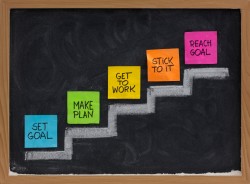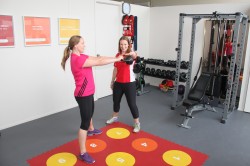
1. Make it real
Once you have set yourself a fitness goal, or a set of short term goals on the way to a long term goal, you have to make it real. One way to do this is to write it down. Going from an idea, to a tangible thing on a page makes a goal seem much more real. Another option is to discuss your goal with someone this might be a friend, partner or your Personal Trainer. Once you have told someone about it, then it’s no longer just an idea in your head and out in the real world!
2. Have a benchmark
It’s important that you know where you are starting, in order to measure your progress. If your goal is weight loss, you need to know what your starting weight is. If you have a performance goal like a certain number of pushups, you need to know how many you can do now! And if you want to change the way you look, it’s a good idea to take pictures and/or measurements so you can see t s as they happen. It’s a good idea to re-evaluate every 6-8 weeks.
3. Make a plan
It’s important that you have a plan in place that will help you to achieve your goal. It’s no good having a goal of running a marathon, without having any idea of how to train for running a marathon. You need to decide what type of training you will do, how often, where, with whom and for how long. Once you have made your plan, put it in your planner and stick to it!
4. Have someone or something to hold you accountable
If you have no-one checking on your progress, it’s very easy to just miss your sessions, or delay your goal if things start to feel a bit too hard. Having someone like a workout buddy or a Personal Trainer holding you accountable is incredibly helpful make you keep going even on the days you’re not feeling like it. If you know they’ll be meeting you at the gym, or giving you a call to see where you are – you’re much less likely to skip! Being financially accountable is also a great motivator to keep you on track – if you know you’ve already paid for your PT session or your boot camp you’re much more likely to go.
5. Make it part of your lifestyle

Keep trying
Remember that changes don’t happen overnight, and habits develop with lots of repetition, so you need to be patient. You will have hard days, and hard weeks, you might even feel like quitting. Stay focussed on the end goal, and don’t give up! If it was easy, everyone would be doing it.


